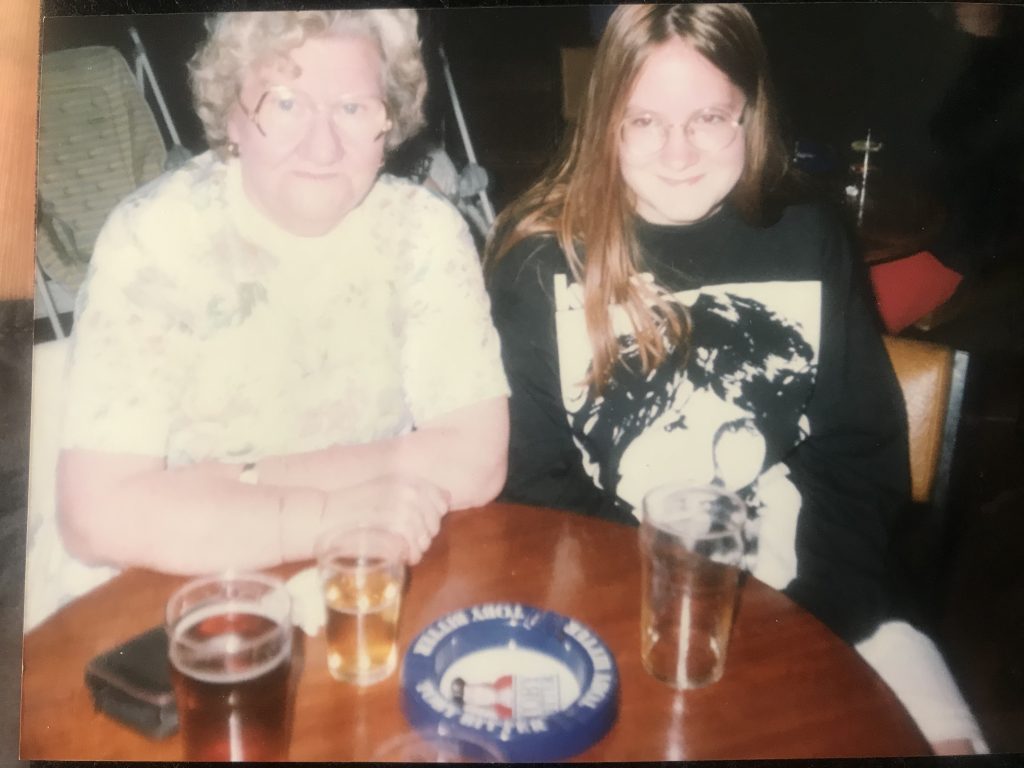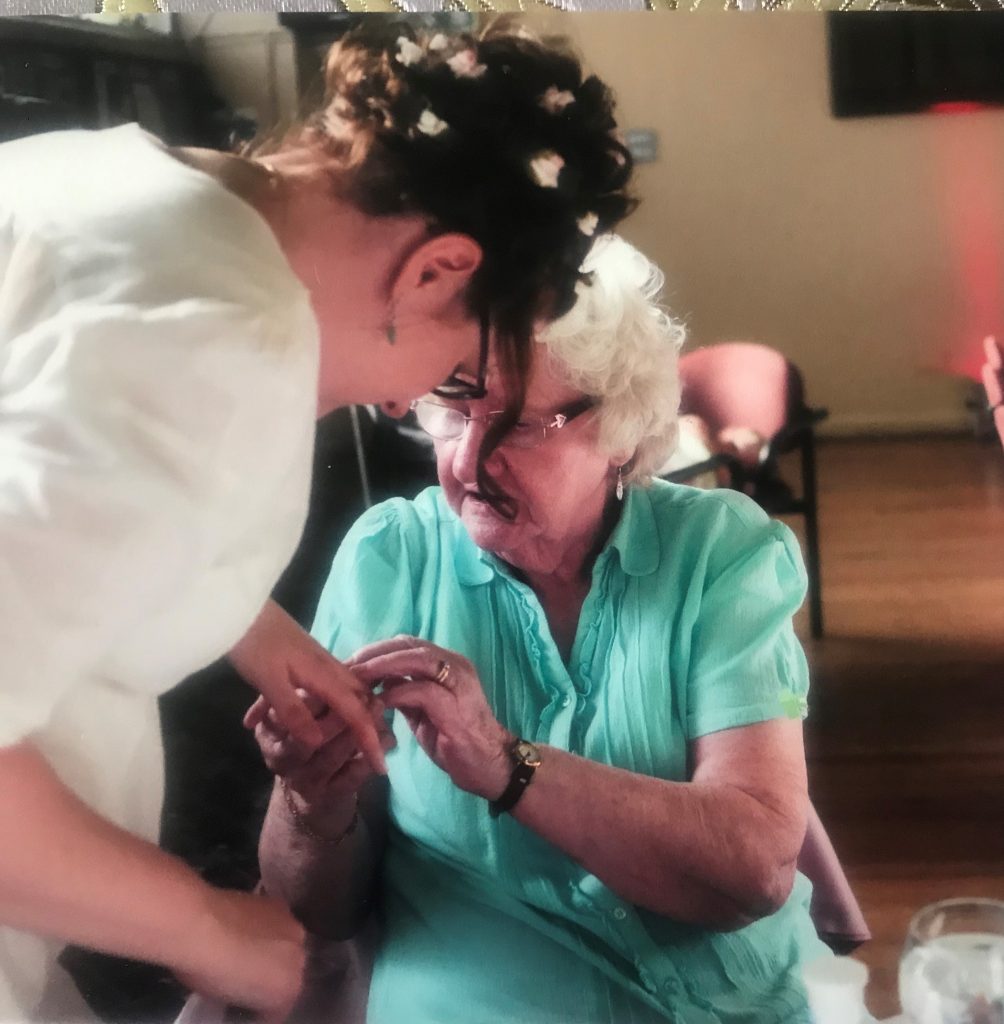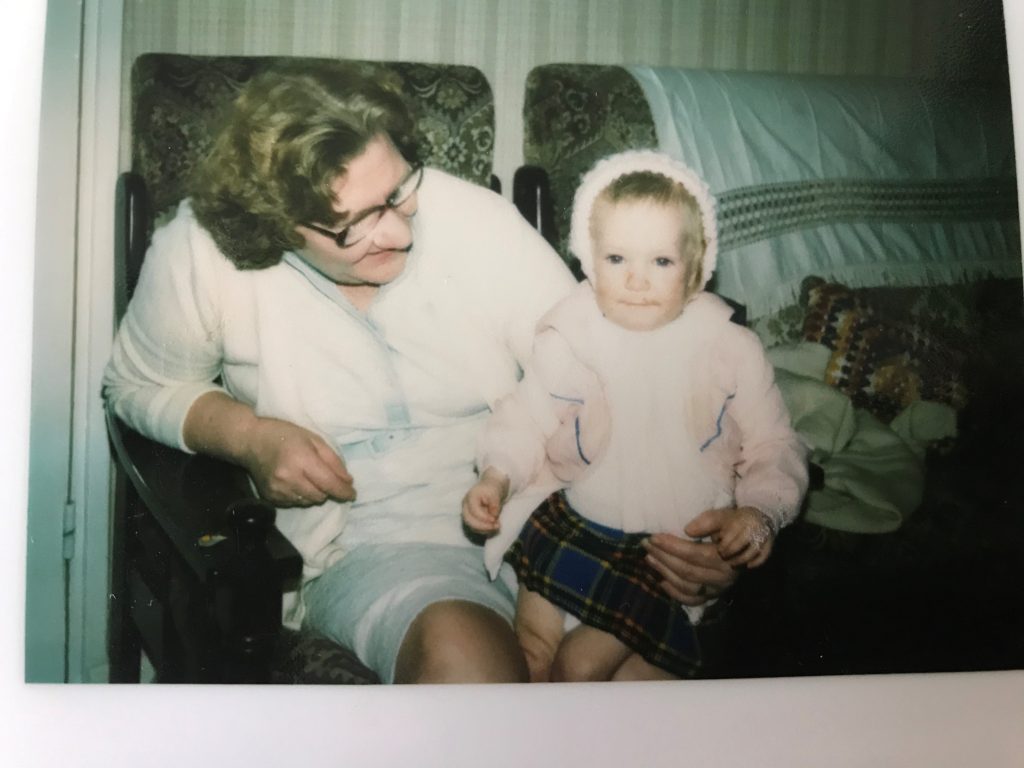Georgina Ashton was born in 1924 near Prestonpans. Her dad was a miner. She went into service at fourteen. She could only see her family once a month. The man of the house bothered her. During the war, she was in the NAAFI. She met Joe Johnson from Fulham, a soldier for the duration. In 1948 they married, and in the 1950s they moved to London. They had five children, three boys and two girls. They were living in a cold, damp rented room when the fourth baby was born. She blamed the squalor and stress for his genetic disorder. They were given a council house in Tooting. A few years later, the menopause turned out to be a fifth baby. They stayed in the house in Tooting. Their children grew up, moved to different parts of London, and had children of their own. Joe died in 2001. Georgina stayed in the house in Tooting, still carer for her youngest son. She got older. The family worried. She couldn’t stay there anymore. She and her son moved closer to her youngest daughter and her family. They moved in with them. Georgina and her son both developed dementia. They needed so much care. Georgina moved into a nursing home in 2019. Somehow, she made it through the worst of the COVID pandemic. No one could believe she manged to hang on so long. She died in May 2021.
***

My nan, Georgina Johnson. The only adult always pleased to see me. Her house the safest place I knew. Always radiating love. I think about her, and it is fragments, child’s eyeline images, running through the front room on a Saturday afternoon, her voice, the smell of her house and her clothes. I don’t know how to build a narrative of her life. I’m not sure of the dates, the names, the places. She had some stories about the past, but not many. Most of what I know about her is refracted through her relation to me. She was solid, she was warm, she was comfortable. She created spaces where her grandchildren could be entirely self-centred, secure in her love. I don’t know much about her life because I didn’t ask. And it might sound wrong, but it didn’t matter. Who we were to each other didn’t have much to do with words. There was never much substance to our conversations. We existed in relation to each other only through love for each other. Her love sheltered me from the moment I was born. It was uncomplicated. She made it easy to take that love for granted. I doubt she ever thought about it, but if she had, she might have said that was her job. That was the way things were supposed to be.
***
I have spoken to lots of women about their lives. I chose to do this as part of my work. I wanted to understand women’s histories, and I have tried to do this by eliciting their stories. Reading back through the transcripts of oral histories that I have collected over the past three and a half years, alongside Kate Mahoney and Daisy Payling, for the most part, women did not say much about their grandmothers. This is because for the most part, we did not ask them. There was only one question on our interview schedule directly about grandmothers, and that in a roundabout way, as a follow-up question: How has your life been different to your own mother’s? How was your mother’s life different to your grandmother’s? We focused a lot on women’s relationships with their mothers in our interviews, but did not trace back further.
We’re not unusual in this respect; writing this without access to a library or my own books, I can’t double-check, but I am fairly sure that classic works on mother-daughter relationships by Carolyn Steedman and Miriam Glucksmann don’t say much about grandmothers either. Now, confronted by the loss of that anchoring presence in my own life – understanding my nan’s presence as an anchor through her irreversible absence – I wonder if this inability to fully see the grandmother, to put her at the centre of our histories, says something about the particular qualities of many loving grandmother-grandchild relationships. We know our (maternal) grandmothers through our mothers; always there, but behind or to the side of our mothers; always part of us, but first of all, part of the person who made us. The happiest mother-child relationship is more fraught, more complex, more inescapable than the grandmother-grandchild relationship. Maybe those of us with happy relationships with our grandmothers simply don’t see their sharpest outlines because they were never the ones who caused us pain, but always the ones who kissed it better.
(Or maybe not. Maybe it is simply a case of not asking, and not listening.)
When asked about differences between the lives of their own mothers and grandmothers, many of the women we spoke to thought first of all about poverty, lack of opportunities, and narrow lives; about grandmothers who went into service, ‘working in a posh house as a servant’, who married young, did not expect to have careers; grandmothers whose ‘job, basically, was to have children, look after the family, cook meals, and generally just be there’. Reflecting on their grandmothers’ lives, women whose own lives had been difficult in many ways often now spoke about progress across the generations: ‘it gets better and better … my mum’s life was certainly better than my gran’s, and my life was certainly better than my mother’s, and hopefully my daughter’s will be better than mine’. But they also spoke about the resilience of their grandmothers; the refugee, terrified of air raids in the war, ‘scared of everything’, but at the same time ‘very feisty’, determined that she and her daughters would survive; the mother of four who ‘rolled up her sleeves and did everything herself’ because her husband was a ‘drunk and wastrel’.
The sideways glimpses we were afforded of grandmothers’ roles were in some ways even more interesting. When we asked mothers where they had found information about bringing up children, many said something along the lines of ‘oh, through my mother and back through my grandmother’. One woman remembered that when she had her first baby, her mother was very annoyed at her grandmother (the baby’s great-grandmother) interfering and assuming that she did not know how to hold the baby properly:
But the funny thing is, when my granddaughter was born, she … my mother did exactly the same to me! And I had a flashback to that moment, and I was nursing my granddaughter, and my mother was saying, “No, no, you must do this’, and ‘you must do that’, and I was like, ‘Oh! You’re exactly the same!’ You know, as if I’d never had an experience of my own child! But I remember, I’m thinking of that moment, ‘Oh, you’re exactly the same as what Nana used to say!’
These were throwaway responses, but they showed awareness of how much passes through the maternal line – how much of everyday care has its roots in relationships stretching back through generations. By the same token, how much of our grandmothers must survive in us, embedded in our smallest movements, untraceable, but part of how we move through the world every day.
***

If I had tried to explain it, much of my life would not have made much sense to my nan. She left school at fourteen and none of her children went to university. She was proud when her grandchildren graduated, but as a concept, ‘university’ didn’t make much sense to her. As for what a PhD meant, forget it. I never tried to explain properly what I do for a living, though maybe in simplifying it, I got across the important bit; she was proud that I’d managed to become a teacher. I never did get up the nerve to explain to her that I hadn’t changed my name when I got married. Minutes after the ceremony, beaming, she said ‘Congratulations, Mrs Grant!’ And Mrs Grant I was, to her, for the rest of her life. That smile meant a lot; she liked my husband, she was always happy to see him too, and she understood this part of my life that for her, meant her granddaughter would be loved and cared for. That was what mattered.
We were divided by generation, by expectations, by life experience. She lived through things that I will never understand, including real, biting poverty, and caring for a disabled child into her nineties. This is one reason I can’t describe her life. But it is also because we were united by other things; the blood tie, but more than that, the willingness to love each other no matter what, to put everything else aside. As she forgot more and more, she did not remember my name, and she was not sure exactly who I was, but for as long as I could see her in person, she knew that she knew and loved me. She recognised me in every way that counted, and she was still always pleased to see me. I still can’t put her into words, but I will make her recipes, I will remember her voice, I will think of her as I try to be that solid, comfortable, unquestioned presence in the lives of the children I know. And sometimes, when I’m lucky, I will dream of her and she will still be here; because in the very deepest part of me, she can never really be gone. Sleep well, nan.


